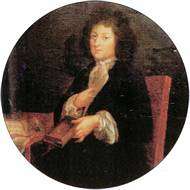Pierre Borel
Pierre Borel (Latin: Petrus Borellius; c. 1620 – 1671)[1] was a French savant: a chemist (and reputed alchemist), physician, and botanist.

Borel was born in Castres. He became a doctor of medicine at the University of Montpellier in 1640. In 1654 he became physician to the King of France, Louis XIV.
In 1663 he married Esther de Bonnafous. In 1674 he became a member of the Académie française. He died in Paris.
He concerned himself with an eclectic range of subjects: optics, ancient history, philology and bibliography. His biographers have tended to deplore his spreading of himself over so many areas.
In The Case of Charles Dexter Ward, H. P. Lovecraft (mis)represents Borellus (sic) as a potent necromancer.[2] In fact, the novels opens with a quote from Borellus.
Works
- Les antiquités de Castres, 1649
- Bibliotheca chimica, 1654
- Trésor de recherches et d'antiquités gauloises et françaises, 1655
- Historiarium et observationum medico-physicarum centuria IV, 1653, 1656
- De vero telescopii inventore, 1655.
- Vitae Renati Cartesii, summi philosophi compendium, 1656.
- Discours nouveau prouvant la pluralité des mondes, 1657.
Notes
- Farber, Eduard (1970–1980). "Borel, Pierre". Dictionary of Scientific Biography. 2. New York: Charles Scribner's Sons. pp. 305–306. ISBN 978-0-684-10114-9.
- Joshi, S. T.; Schultz, David E. (2001). An H.P. Lovecraft Encyclopedia. ISBN 9780313315787.
References
- Marie-Rose Carré, A Man between Two Worlds: Pierre Borel and His Discours nouveau prouvant la pluralité des mondes of 1657, Isis, Vol. 65, No. 3 (Sep., 1974), pp. 322–335
- Pierre Chabbert, Pierre Borel (1620 ?-1671), Revue d’histoire des sciences 21 (1968), 303-43.
External links
- (in French) Didier Foucault,Pierre Borel